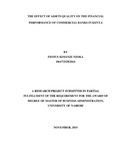| dc.description.abstract | The objective of this study was to determine the effects of assets quality on the financial performance of commercial Banks in Kenya, between the years 2010 to 2014. The Asset quality also referred to as loan quality has been defined as the overall risk attached to the various assets held by an individual or institution. It measures how well a financial institution predicts the credit risk of their assets and how well they manage them. On the other hand, financial performance is a measure of how well a firm can use assets from its primary mode of business and generate revenues. This term is also used as a general measure of a firm's overall financial health over a given period of time, and can be used to compare similar firms across the same industry or to compare industries or sectors in aggregation. The study adopted a descriptive design in its methodology and the researcher chose to study commercial banks due to availability of needed data and convenience. All the 43 commercial banks in Kenya were targeted for this study. Secondary data was obtained from annual Central bank of Kenya Banks supervision reports. SPSS version 20.0 was used for data analysis. The t-test with a 5% level of significance was used in the study and the correlation coefficient (r), coefficient of determination and analysis of variance (ANOVA) were calculated. The analysis showed that all the asset quality factors had a fairly statistical significant impact on financial performance. This was due to the fact that assets quality cannot solely determine the financial performance of commercial banks, unless other factors such as capital adequacy, management efficiency, earnings performance and liquidity are considered. The relationship between asset quality and financial performance was confirmed to be negative. Based on the findings, the study recommended that for high assets quality levels to be achieved, improved investment assets levels and the low rate of Non Performing Assets are to be realized through credit risk identification, measurement, monitoring and controlling. Further research on the factors influencing the asset quality of commercial bank in the country could add great value to the performance of local banks and academic literature. | en_US |



